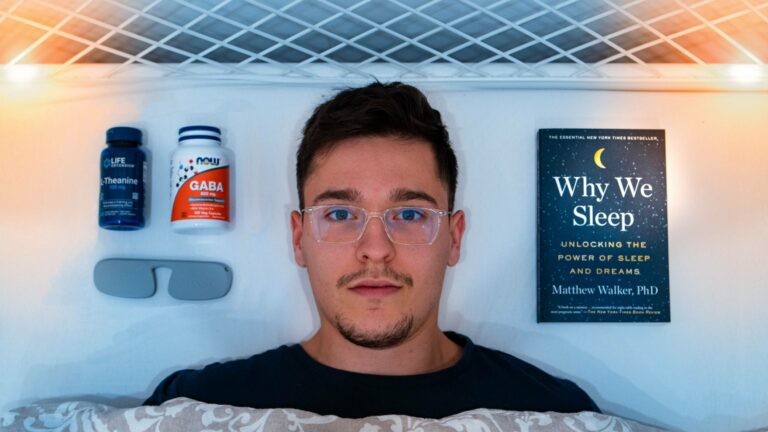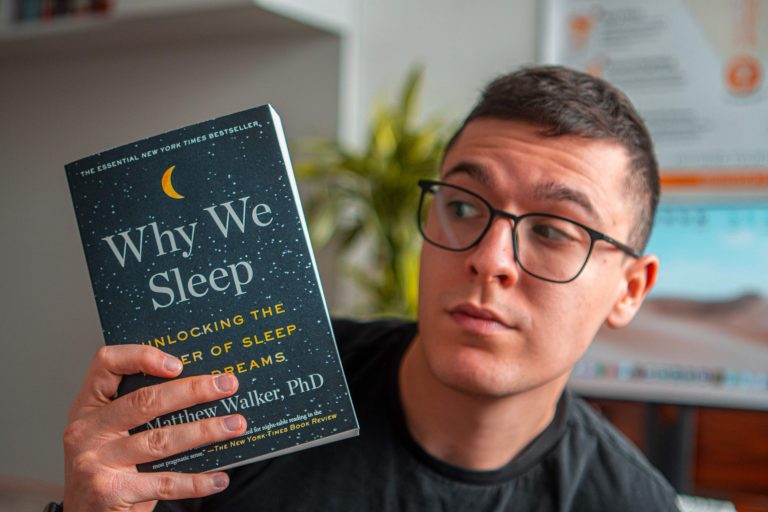7 Benefits of Deep Sleep – Cognition, Health & Longevity
Sleep is a natural biological process of regeneration, which is extremely important for health and longevity. There is growing attention on optimizing sleep to enhance productivity, mood, memory, and even heart health.
But what are the benefits of deep sleep? How does it impact health and longevity? Does deep and restful sleep actually affect our heart health, exercise performance, and mood so significantly? Let’s dive in!
Sleep Phases & Physiology
Sleep has different stages or phases, which have specific effects and benefits on our bodies. Most tracking devices and sleep optimization hacks and programs aim at improving and lengthening the time spent during deep N3 and REM sleep.
N3 or the Non-REM 3 sleeping phase is the most regenerative, deep restorative sleep we can get. The brain reduces its activity to a band known as delta waves – being relatively inactive – which is where the best recovery, reorganization, and growth happens.
The stages of sleep are split into Non-REM and REM phases. REM stands for rapid eye movement, which is the only movement that occurs during the REM phase. Other parts of the body are paralyzed from movement, as otherwise, we might replicate the moves in our dreams – which happen in REM. (1)
Non-REM NR1
Non-REM NR2
Non-REM NR3
REM sleep
Non-REM or NR1 is the shallow or light sleep stage – feels like drifting off, 1-7 mins, EEG 8-13 cycles per second.
Non-REM or NR2 stage is light sleep accompanied by a feeling of relaxation. It lasts approximately 10 to 25 minutes, 50% of total sleep, EGG low voltage.
Non-REM or NR3 phase is entering deep sleep, you’ll feel groggy upon waking up. It lasts about 20 to 40 minutes, EGG high-voltage, and it’s a slow wave sleep.
REM is the phase of sleep accompanied by vivid dreams. Both <2 Hz waves and Faster 2.5-3 Hz occur. (2)
The interplay of certain hormones in the body affects our sleep. They control the circadian rhythm, which is approximately 24.2 hours. When melatonin levels increase, which is at night during the deepest sleep, you can lower the temperature and enter deep sleep mode. (3)

Fun Fact
Temperature can heavily impact our ability to fall and stay asleep. Usually, our body temperature is the lowest somewhere at around 3-5 AM – which is where the deepest and most restorative sleep happens.
How Sleep Affects Your Health
Sleep is an extremely effective way to reorganize neural structures and regenerate the body. The way we can showcase the benefits of sleep is mainly by seeing how sleep deprivation can detrimentally affect their right.
In the scientific literature, it’s very well known that poor quality, low duration, or inconsecutive sleep patterns can detrimentally affect metabolic markers, inflammation, hormone levels, etc.
Sleep deprivation can lead to weight gain, insulin resistance and increase the risk of cardiovascular disease. (4) (5) Plus, poor sleep can impair our cognitive processing, reducing our ability to learn and memorize new things. (6) (7)
Sleep loss is also heavily related to increased inflammation, which is where most modern-day metabolic diseases originate from. (8) It leads to a weaker immune system, (9) meaning catching a cold is more likely. (10)
Conclusion
Sleep is an important regenerative process that regulates many physiological functions in the body. It helps repair tissue, reorganize neural connections, balance hormones, and fight inflammation so we wake up ready to tackle the next day.
What is Sleep Hygiene?
Sleep hygiene refers to one’s sleeping habits that can greatly affect sleep quality. Such includes the time you go to bed and wake up, so sleeping schedule consistency. Also, light exposure, caffeine intake, and sleep environment are huge parts of it. Having good sleep hygiene means you optimize your habits to increase sleep quality.
How many hours of sleep do I need each night?
The average recommendation is 8 hours of sleep a night for adults. This varies between people and ages, but somewhere around the optimal for adults is around 7-9 hours a night. Children need more sleep, while older adults usually sleep less.
What are the different stages of sleep?
Broadly, we can split sleep into Non-REM and REM phases. There are 3 NREM phases and 1 REM, in which we dream. Each stage performs a different task, such as memory consolidation or energy restoration, and is distinguished by particular brain wave patterns and bodily changes.
Sleep Recommendations
On average, it’s recommended that individuals get at least 8 hours of sleep each night. That’s not time spent in bed, but actually, time sleeping. There are certain differences between children, youth, adults and elderly adults. (11)
According to the National Sleep Foundation, these are the updated sleep duration recommendations:
- 14-17 hours for newborns
- 12-15 hours for infants
- 11-14 hours for toddlers
- 10-13 hours for preschoolers
- 9-11 hours for school-aged children
- 8-10 hours for teenagers
- Seven to 9 hours is recommended for young adults and adults
- 7-8 hours of sleep is recommended for older adults.
You can quickly see that the younger we are, the more sleep we need. This is partially because the younger we are, the more we need to grow, develop and regenerate, and sleep is the master of that.
Conclusion
On average, it is recommended that young adults and adults get around 8 hours of sleep (7-9 hours) each night. The younger we are the more sleep we need, the older we are, the ability to sleep diminishes.
7 Benefits of Deep Sleep
The benefits of sleep can range from improving cognitive performance to reducing the risk of cardiovascular disease. Why is sleep so important? It is due to sleep’s ability to support many physiological functions and regeneration that it supports overall health and well-being.
1. Sleep and Cognition
During sleep, thousands of little processes occur in the brain. These make it ready, alert, and refreshed for the next day. It helps reorganize neural structure, consolidate memories, and enhance focus and concentration.
Sleep can improve vigilant attention, which is for performing tasks. Consecutive days of restricted sleep lead to cumulative deficits in this type of attention that get worse with more sleep loss. (12)
Another cross-sectional study shows that unpredictable work hours can lead to sleep impairment, which is associated with increased odds of error the more we lack sleep. Self-reported errors were 97% and 96% for very and high sleep impairment, and 53% for moderate SI. (13)
Poor sleep has been shown to reduce academic performance, grades, and cognition in students. (14) (15)
Conclusion
Sleep is an essential process for regenerating cognitive abilities. It plays a massive role in memory, cognition, and attention. Low quality of sleep or sleep restriction can lead to weaker attention, processing, and memory.
2. Cardiovascular Health
One of the interesting areas where sleep has a very strong effect is cardiovascular health. It seems that many metabolic and inflammatory markers, which deteriorate our health, are increased with sleep deprivation.
It’s no secret that sleep is essential for overall health and well-being. (16) Epidemiological studies have shown that depriving people of sleep can increase coronary heart disease risks and hypertension. Partially, these mechanism relies on an increase in sympathetic nervous system activity. (17)
Insufficient rest time and overactivation don’t let the parasympathetic nervous system take over and regenerate the body in a deep and restful state. We’re in constant catabolism, overactivated, and anxious.
Sleeping under 7 hours (too little) or over 9 hours (too much) can lead to an increased risk of mortality, cardiovascular disease, and inflammation. It’s interesting how this U shape curve has shown the most benefits of sleep in adults are gained at around 8 hours of sleep, so somewhere in the middle. (18) (19)
Depriving people of sleep can also increase heart rate variability – an important marker for metabolic and cardiovascular health. This again showed a decrease in parasympathetic activity, detrimental to heart health. (20)
Conclusion
Most of the benefits of sleep are gained at around 8 hours of sleep for adults. Sleep deprivation can increase heart rate variability, inflammation and reduce parasympathetic activity, which is detrimental to heart health.

3. Sleep and Weight Loss
Sustaining a healthy weight depends on many processes. Besides exercise and a healthy diet being, sleep can heavily impact the rate at which you can burn fat. Additionally, sleep has a tremendous impact on inflammatory factors, glucose control, insulin sensitivity, and other hunger hormones – important for weight loss.
Insufficient sleep causes hormonal imbalances which increase the drive to consume more food. It decreases leptin and increases ghrelin and cortisol level. This leaves you more stressed and hungry, or should I say hangry? (21) (22) (23)
A study investigated sleep’s impact on weight loss in people sleeping either 5.5 hours or 8.4 hours for 14 days. Metabolic changes, energy use, and perceived hunger were all inferior in the group that slept less. Also, the 5.5 hour group lost 55% less body fat and 60% more fat-free mass. (22)
Low sleep is detrimental to energy metabolism – leading to overeating. This results in weaker glucose utilization, tolerance, and accumulation of fat. (24)
Research also shows a strong association between sleep deprivation and an increase in obesity cardiovascular diseases and hypertension. (25)
conclusion
Sleep enhances our ability to utilize glucose, balance hunger hormones, and use energy. Poor sleep quality can lead to an imbalance of ghrelin and leptin hormones, leaving us less energetic and hungrier – ultimately leading to overeating.
4. Sleep on Exercise and Recovery
If you’re into smartwatches or health trackers, you’ll know they’re heavily targeting sleep optimization in athletes. That’s due to the effectiveness of sleep to regenerate the body, replenish our energy, and repair tissues.
Sleep supports the adaptative processes that occur during training. While lifting weights we tear the muscle down. It’s during sleep that we build it back. The result is we get stronger, faster, more efficient, and build stamina.
Sleep hygiene is a known term that relates to consecutive and consistent sleeping habits. It’s especially emphasized in elite athletes as it increases their strength, accuracy, endurance, and reaction times. (26)
There’s even a term banking sleep, which is known as extending our sleep the night prior to our event to improve athletic performance. (26)
Extra Research – Sleep Effectiveness
More research on sleep shows sleep effectiveness in:
conclusion
Sleep is an essential part of recovery for both athletes and non-athletes. It regulates most regenerative processes, especially helping to repair tissue and balance hormones which results in better athletic performance.
5. Insulin Sensitivity
Eating food (especially carbs) spikes blood glucose levels. Insulin is secreted to transport glucose into tissues. But with too much sugar, of frequent consumption we may overload our insulin, to the point where it’s not as sensitive anymore – this is insulin resistance.
Quality sleep can support this energy metabolism. It may enhance insulin sensitivity by increasing glycogen stores and reducing glucose turnover – which happens during NREM sleep. (31)
There’s a strong association between poor sleep or sleep deprivation and insulin resistance. This leads to higher inflammation, obesity, and progressively even to diabetes. (31) (32) (33)
Sleeping problems also detrimentally affect hunger hormones like ghrelin and leptin which additionally contribute to eating more and gaining more than optimal weight. (34)
A cross-sectional study of 133,608 subjects showed how sleep duration is related to metabolic syndrome. They split them into 4 groups, sleeping either <6h, 6-8h, 8-10h or >10h. Again, the U-shaped effect took place. Those sleeping below 6 h or above 10 h showed poor metabolic markers – increased triglycerides (men), waist circumference, lower HDL, and higher fasting glucose (women). (35)
Conclusion
Low-quality sleep or sleep deprivation can detrimentally affect metabolic health – as it increases cholesterol, fat mass, and hunger. That’s why sleep is important in maintaining healthy insulin sensitivity and balanced hunger hormones.

6. Sleep and Memory
During sleep, some of the most vital processes to cognition and memory occur, such as:
- reorganizing neural networks
- reducing neural inflammation
- consolidating memories
- creating new neural pathways
- reducing plaque and junk accumulation
Consequentially, sleep leads to better cognitive performance. Not just that, but the ability to memorize drastically improves. I mean, how much can you memorize if you don’t sleep? Have you heard the phrase “sleep on it”? It’s used to make better rational decisions and judgments, and even as a more efficient way to learn something.
Sleep regulated metabolism and improves memory recall. Acting on the lymphatic system, it removes the “junk” or toxic byproducts produced, so we wake up refreshed and alert. (36)
Here’s the research on sleep and memory:
- sleep deprivation in 22 healthy subjects reduced working memory (37)
- sleep quality and time in bed predict morning cognitive performance in children (38)
- Sleep provides memory consolidation benefits that extend beyond just those of retrieval (recall, repeating) of information. (39)
- 24 h sleep deprivation in 32 young men led to weaker execution speed, reaction time, and accuracy in tests. (40)
Conclusion
Sleep helps replenish the brain, leaving us more alert and refreshed. It helps consolidate memories, reorganize neural structures, and remove junk or toxic byproducts that make our brain “cleaner”.
7. Sleep on Mood and Depression
Have you noticed how after a poor night’s sleep you’re more sensitive, not as humorous, and a bit moodier? It’s like we can’t judge rationally, take jokes on our account, or experience gratitude. This isn’t a coincidence.
Dopamine is one of the most important hormones that affect mood. It gives us the feeling of satisfaction, motivation, and reward. It’s why we do most stuff.
In human brains, sleep deprivation has been shown to reduce dopamine D2/D3 availability, which funny enough increased sleepiness. (41) Although we need more research on it, it sort of clarifies a link to how sleep may improve or restore mood.
- Many studies show the relationship between sleep deficiency (or deprivation) and depressive mood. (42) (43)
- In a 34-cohort study meta-analysis looking at 172,077 participants – depression was heavily associated with insomnia. (42)
Even in terms of social distancing and loneliness, sleep plays a role. it’s hypothesized that our behavior switches to that of social withdrawal and separation. (44) It may even cause emotional imbalance and instill a detrimental reward-seeking behavior. Plus, as funny as it sounds, it may make us less empathetic, trustful, and humorous. (45)
conclusion
Sleep is essential for balancing out neurotransmitters like serotonin and dopamine which control our mood. Sleep issues can lead to moody, socially isolating, and reward-seeking behavior. Quality sleep can restore and balance out hormones -restoring a positive mood back.
Detrimental Effects of Sleep Deprivation
Sleep deprivation can be detrimental to overall health and well-being. As it’s an essential regenerative and restorative process, depriving humans of sleep comes with a myriad of health issues and poor performance. (4) (6) (8)
From moody feelings, hunger, and poor cognition to increased inflammation, cardiovascular disease risk and weight gain – sleep deprivation affects it all.
Poor Cognition
Cardiovascular Disease
Poor Memory
Inflammation, Immunity
Insulin Resistance
Weight Gain
Mood and Depression
Poor Recovery
Poor Cognition -slower reaction time, weaker information processing, mental fatigue, and reduced alertness
Cardiovascular Disease – higher blood pressure, reduced parasympathetic activity, higher cholesterol and triglycerides, increased (HRV) heart rate variability
Poor Memory – poor memory recall, poor working, and spatial memory, fewer neural networks, weaker memory consolidations
Inflammation, Immunity – increase pro-inflammatory factors, weaker immunity responses, higher prevalence of cold (flu), weaker innate immunity
Insulin Resistance – poor glycemic control, weaker insulin sensitivity, increased blood sugar levels
Weight Gain – increased ghrelin levels, increased needs for energy (food), increased hunger and stress, poor metabolic markers
Mood and Depression – lower dopamine availability, higher depression scores with SD, hormonal imbalances, social isolation, less empathy, humor, and trust
Poor Recovery and Exercise Performance – higher accumulation of byproducts, extended inflammation, extended muscle recovery, extended repair of connective tissue
Conclusion
When it comes to our overall well-being, sleep is an essential component that can play a significant role in maintaining a healthy mind and body. The benefits of sleep are many, and can be observed in areas such as mood, cognition, recovery, and health. By getting a good night’s sleep, we are able to improve our memory and cognitive function, which includes the ability to think, reason, and remember things clearly. Furthermore, sleep helps regulate our mood and emotions, keeping us feeling balanced and stable.








